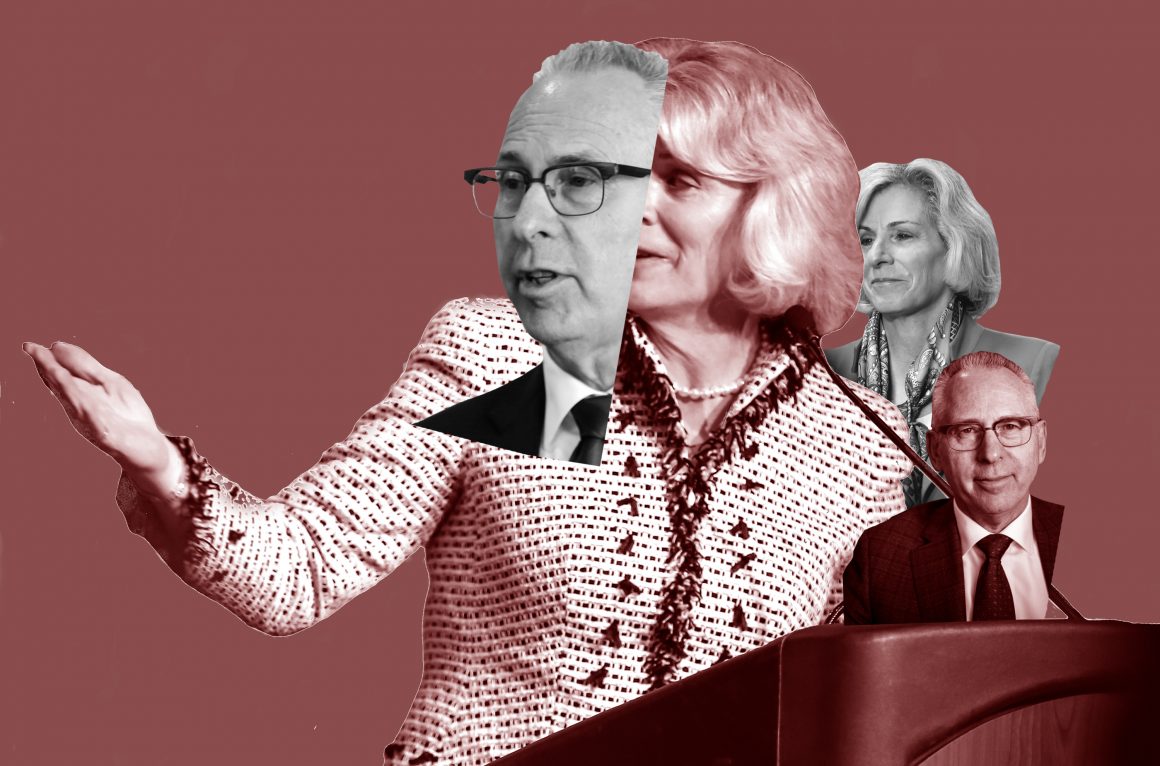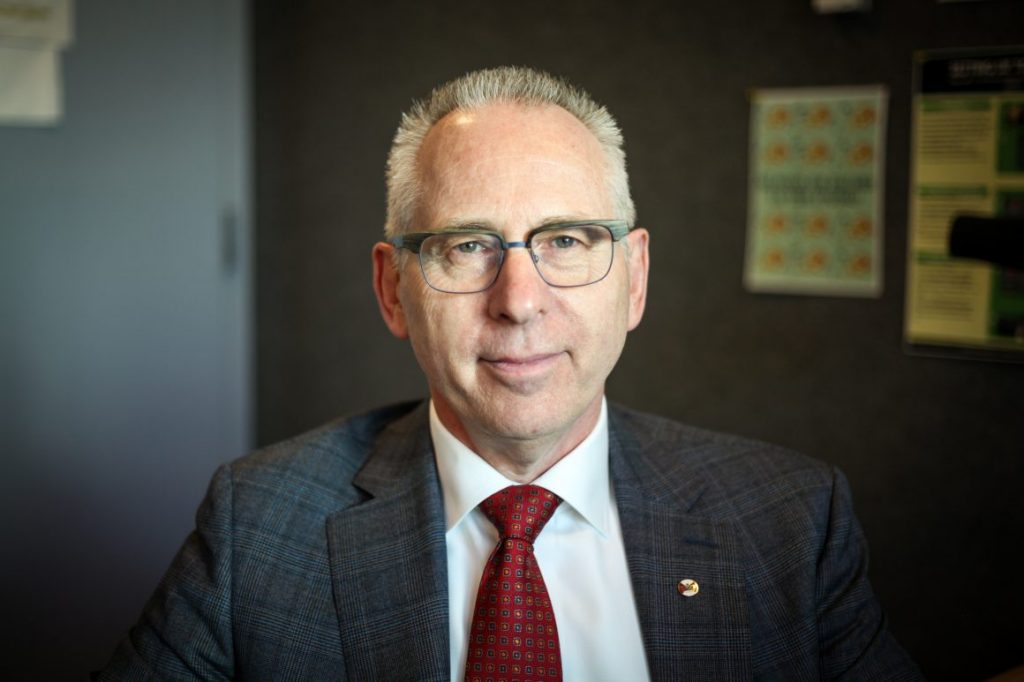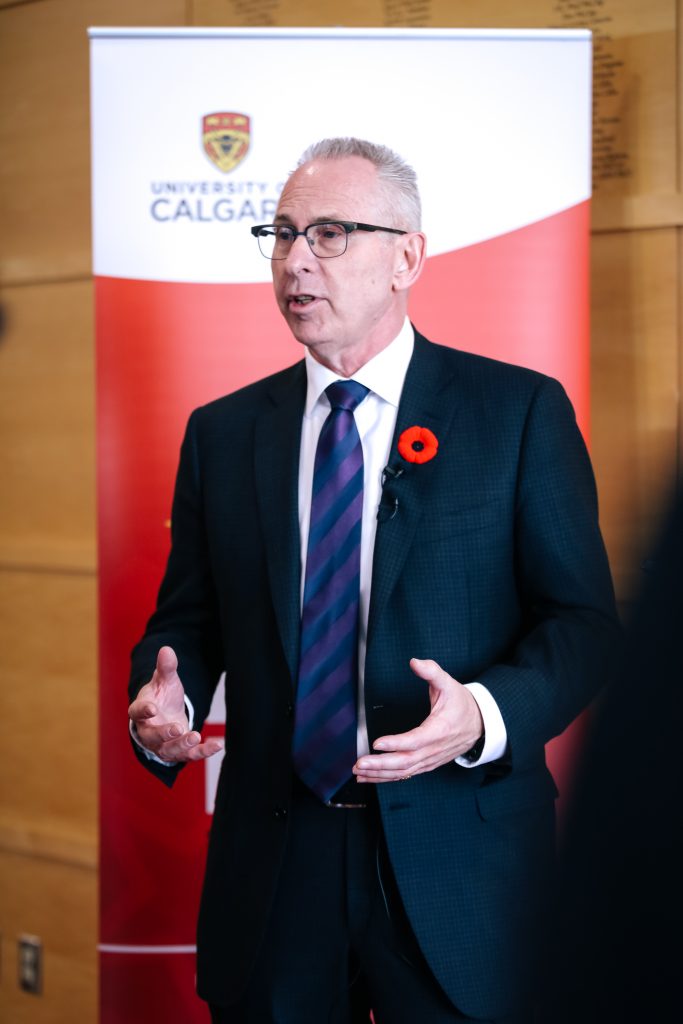
Eight more years? A look at Ed McCauley’s presidency to come
By Gayathri Peringod, April 5 2019 —
At the front of the room stood a silver-haired man in a royal-blue suit, his back to the audience, fidgeting. It was a Thursday morning in a lecture theatre in Craigie Hall, the room peppered with staff and postdoctoral students chattering away with one another.
Ed McCauley, the freshly minted president of the University of Calgary, was giving students the chance to speak with him, the UCalgary Newsletter announced to students in a February email. “Conversations with the President” invited all students, postdoctoral scholars, faculty and staff to have an “informal conversation” with the man of the hour before his official installation in April. After a general meet-and-greet at the end of January, he would come to each faculty — starting with the Cumming School of Medicine in February and ending in May — to listen to concerns voiced by attendees. This particular event, held on a warm March morning, was for the Faculty of Science.
The “Conversations” series came at a precipitous time in McCauley’s presidency, three months preceding his official instalment on April 8. The press around the commencement of his term has been carefully handled. When we reached out to university administration for an interview with McCauley for this piece, the university’s strategic communications department emailed back, saying that he wasn’t going to make himself available for any media interviews until the day of the installation itself, when he planned to unveil his priorities. A later email pushed back any potential interview to several days after the event. (Editor’s note: After the publication of this story, the U of C rescinded our scheduled April 11 interview with McCauley.)
There are many reasons why the administration’s strategic communications team may want to make a strong first impression at the start of this presidency. McCauley moves into his role at an awkward time. In a January 2018 YouTube video, Elizabeth Cannon unexpectedly announced her resignation from the presidency a year and a half before her contract was to expire in June 2020. The UCalgary website delivered the news via a message from the chair of the school’s Board of Governors, who praised Cannon as an inspirational leader that accomplished an array of achievements. The university provided no official reason for her resignation.
Cannon had a contentious presidency. Her resignation came two years after her administration came under fire for allegedly compromising the university’s academic freedom. The Enbridge affair, as it is now called, came to light after a 2015 CBC investigation revealed that the energy company Enbridge wielded considerable influence within the Cannon administration in relation to its significant monetary donation to the university. The university and Cannon denied any wrongdoing.
Since then, two separate investigations were launched into the matter. The first was by the Canadian Association of University Teachers, which reported a conflict of interest in Dr. Cannon’s paid position as a member on one of Enbridge’s boards and her duties as university president. The other was launched by the university itself and cleared the administration of misconduct. The results of the internal investigation were accepted by both BOG and the Students’ Union. Still, the controversy led to a slew of media coverage and the departure of multiple professors and culminated in a Town Hall moment in which a frustrated student asked for Cannon’s resignation in 2015.
Leaders try hard to shape perceptions of their accomplishments — it’s what they’ll be remembered for, after all. But they may have less say in shaping their legacies than they would like. Legacies are imposed, not created, and controversies can cast a long shadow over any leader, regardless of how hard they try to fight it. Cannon’s controversies haunted her until the end. A CBC report on her resignation dedicated an entire section to her scandals, titled “Recent controversies.” Criticized as being detached from her students and prone to corporate influence, Cannon’s critics were able to define the latter years of her term for her. McCauley, fresh into his term, now faces the daunting task of defining his own presidency before it is defined for him.

The “Conversations” event began a few minutes past 11 a.m. when the silver-haired man introduced himself as Dr. Ed McCauley. “Of course, I don’t need to introduce myself to you all,” he joked. “I know each and every one of you. I will be calling you out by name if you don’t say something.” The crowd laughed — over 4,000 students, faculty and staff from the Faculty of Science had been invited, and yet the audience at the event consisted almost exclusively of faculty and staff.
McCauley welcomed all to the talk, making a lighthearted pun about the name of the event before recapping his career. (Apparently, “Ed Talks” was a big contender for the name before they settled on “Conversations.”) He then opened up the floor to a question-and-answer session. “Feel free to ask me anything at all,” he said. A long, pregnant pause followed as attendees exchanged glances.
Finally, a woman in the front row raised her hand. “I’m the director of development of the Faculty of Science,” she said, before talking about the geophysics department’s need for funding and wondering if the administration could allocate more resources to it. McCauley thanked her for her question. He talked about his meetings with donors in events held in Palm Springs before emphasizing that the campus was a big university family and that there was no need to be competitive for funding between faculties. He looked at her and nodded with satisfaction. “Any other questions?” The silence returned.
As the event continued, attendees settled into their chairs. McCauley opined on stage in a talk reminiscent of a lecture, the audience members playing the role of student. There was nothing informal about the event, but faculty members were happy to lament about the lack of funding for their respective departments anyway. McCauley was more than affable in response — he was charismatic, lively and funny, teasing the staff about their obsessions with equations, making greying quantum mechanics professors blush with embarrassment and the room erupt in laughter every so often.
It struck me sometime during the event, however, that I was finding it difficult to follow many of the points he was making — his long and sometimes-rambling answers never tackled staff concerns head-on, and the words “innovation,” “discovery” and “creativity” were used more times in the hour than I’d ever heard before. Acronyms I didn’t know existed — EPR and CHR and CFI — were tossed around casually to nodding staff members. Esoteric conversations about NSERC funding mechanisms and the provincial government’s policies would likely leave the average person bewildered. I wondered how other students would have fared in this so-called informal conversation, had they attended.
Does he plan on doing anything differently from the previous president, I asked at some point.
“The University of Calgary’s in a great trajectory with Eyes High, and in a large amount that can be attributed to Elizabeth when she became president in 2010,” he replied. “We have Eyes High, we have great academic and research plans, which have been created from the bottom up and endorsed throughout the community.”
McCauley paused for a moment. “So, no deviation in course, but part of this ‘Conversations with the President’ is hearing what the community’s aspirations are, besides some of the issues brought up by the faculty.”

McCauley’s selection as president was announced late last year amid a rigorous global search for a leader. He was chosen by a unanimous recommendation from a pool of 400 candidates. He stepped into the role eight weeks after his selection was announced, leaving his position as vice-president research vacant. Previously, McCauley had worked at the U of C for more than 30 years. As a professor, he taught ecology and evolutionary biology.
McCauley then went on to become the U of C’s vice-president research in 2011, working closely under Cannon during her presidency. Apart from its fair share of controversy, the previous presidency carried the typical characteristics of a young and growing university’s administration. One key goal separated it from its predecessors, however — to make the U of C a top-five research university by 2016. The now-famous Eyes High vision was launched with the intention of firmly rooting U of C as an anchor institution in the world of research. During Cannon’s term, sponsored research funding went up 48 per cent from 2011, according to the 2018 report on the Eyes High plan. The administration also notably launched an institution-wide Indigenous Strategy, highlighting current initiatives and recommending future projects, in addition to opening research facilities in multiple programs.
The Eyes High strategy was revived in 2016 after the Research Infosource Inc. metric ranked the university sixth in Canada in terms of research focus. The university’s overall rankings fell over the years of the past presidency, according to certain metrics. One of the world’s most prestigious university rankings, the QS World Rankings, rated U of C at its all-time low of 229 in Cannon’s final year, down from 218 in 2010.
McCauley served on Cannon’s executive team and helped develop the Eyes High strategy. Along with U of C provost and vice-president academic Dru Marshall, he led the development of the university’s academic and research plans, described as the “roadmaps to the Eyes High vision.” It isn’t surprising, then, that McCauley wants to continue implementing the “energized” Eyes High strategy as it was developed, which aims for the same top-five goal to be reached by 2022.
The strategy itself is a 13-page poster, with pictures of the city skyline and campus infrastructure dominating each page — phrases like “transformative journey” and “promising future” scatter each paragraph. Its three “foundational commitments” are to sharpen focus on research and scholarship, enrich the quality and breadth of learning and fully integrate the university with the community — all laudable goals for any university. But the strategy, which was launched by Cannon near the start of her presidency, has become a label synonymous with the Cannon administration. For an administration that appears determined to provide McCauley with a fresh start in terms of public image, the decision to continue naming its strategy Eyes High would be a curious one.
What of this new presidency, then? Should students expect more of the same from the past or will the administration work to encompass a larger list of priorities?
SU president-elect Jessica Revington appeared optimistic for the dawn of a new era in an interview to the Gauntlet in March. “There are definitely some things from Dr. Cannon’s presidency that we weren’t thrilled to see,” she said. “That happens in every presidency, though. I think Dr. McCauley is in a very interesting place where he can take what happened during Dr. Cannon’s presidency and use it to inform his decisions.”
However, if Eyes High were to stay the same, the SU president-elect would work to advocate for other priorities.
“One of the challenges with Eyes High is that there aren’t a lot of direct actionable items that can address things like creating student community,” Revington said carefully. “I think it’s our role as the Students’ Union to work with [McCauley] in a collaborative way, but also not be afraid to challenge him if we feel that he’s not making enough actionable change.”
So will McCauley do anything differently from Cannon during his presidency? Revington is, again, hopeful.
“Based on what I’ve seen so far with [“Conversations with the President”], those are very promising and positive steps to show that Ed is committed to engaging with the campus community in a different and direct way,” she said.
The “Conversations” series certainly is the mark of an administration wanting to appear receptive to student and community feedback and perhaps even a sign of McCauley looking to mould his presidency to accommodate student and faculty concerns. Only time will tell whether this inclination will persist beyond the efforts of his strategic communications team.
Correction: This story previously listed the first “Conversations with the President” session as with the Faculty of Veterinary Medicine in March. In fact, the first session was with the Cumming School of Medicine in February. Additionally, this story previously listed the final “Conversations” session as taking place in April. In fact, it takes place in May. The Gauntlet apologizes to its readers for these errors.
